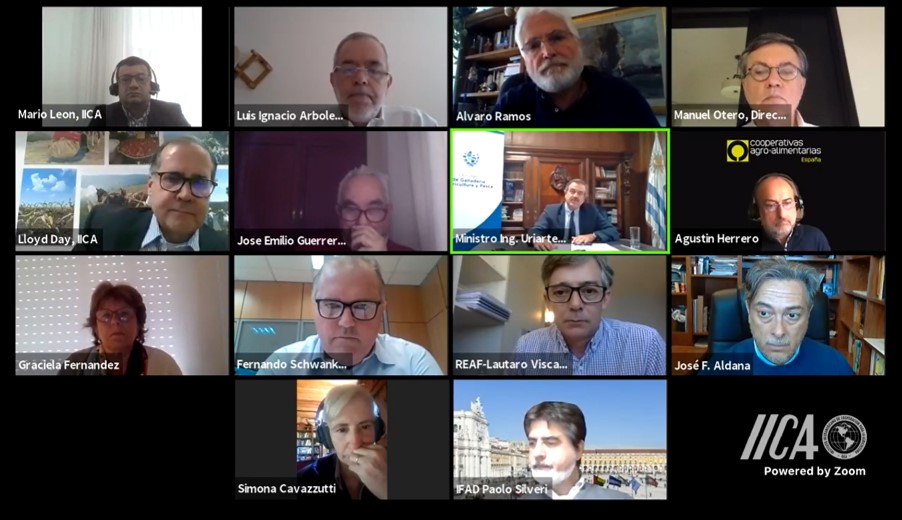The five-year program will begin in March 2021, with organizations from at least 12 countries of Latin America and the Caribbean participating in the initial stages.

San Jose, 11 December 2020 (IICA). The Inter-American Institute for Cooperation on Agriculture (IICA) and the organization, Cooperatives of the Americas, announced the program, Digital management of cooperative services for family farming production and marketing. The program will seek to bridge the digital technology divide, while strengthening productivity, competitiveness and market access and improving the standard of living of the hemisphere’s family farming (FF) sector.
The five-year initiative will be implemented in phases, starting in March 2021, with the support of the Universities of Córdoba and Málaga in Spain.
The initiative was announced in a virtual forum on Digitalization of Cooperative Services for Family Farming, which included participants, such as Carlos María Uriarte, Minister of Livestock, Agriculture and Fisheries of Uruguay; Fernando Schwanke, Secretary of Family Farming and Cooperativism of Brazil; Manuel Otero, Director General of IICA; Graciela Fernández, President of Cooperatives of the Americas, as well as cooperative sector and funding agency representatives.
Uriarte pointed out that the pandemic has accelerated digitalization – a challenging process, given the need to ensure that rural areas have access to connectivity. This will strengthen FF and facilitate direct contact between producers and consumers.
“Uruguay completely supports and applauds this initiative”, he said. “We must now follow up with concrete actions. The pandemic has increased the urgency of moving forward with digitalization and information and communication technologies (ICTs). We must make them accessible to rural inhabitants, which requires proper connectivity”.
Shwanke, on the other hand focused on the value of the cooperative system, based on the experience of his country, indicating that, “It is an extremely strong and important aspect of our agriculture sector. Brazilian cooperatives have one million members, accounting for almost 5% of the Gross Domestic Product. They are vital to the development of FF. We are working assiduously with the cooperative sector, as it provides more immediate access to reach farmers throughout the Americas.
“This initiative will produce concrete results; partnerships are worthwhile when they are productive and create an impact. No one can question the fact that FF is the backbone of more than just food production, which is something that the pandemic has made clear. Family farmers are the ones that breathe life into rural areas. They are the guardians of biodiversity and the ones who best understand the new production methods”, said Otero.
The IICA Director General emphasized the importance of agricultural cooperatives, given the services they offer to FF and their key role in facilitating producers access to various markets.
He stressed that, “Providing cooperative services to family farmers, through digital technologies, is an important means of reducing transaction costs and leveling the playing field for the benefit of FF”.
Characteristics
The program will aim to assist the cooperative sector to strengthen its digital technology capacities; it will also facilitate inter-cooperation experiences and knowledge transfer among cooperatives from at least 12 countries in Latin America and the Caribbean.
Another intended outcome of the program will be the establishment of the Cooperative Center for Digital Skills Transfer for family farming, which will bring together capacities and actions for training, technological development and the implementation of appropriate digital technologies for the cooperative sector.
President of Cooperatives of the Americas, Graciela Fernández, remarked that, “We believe that peer-to-peer learning is essential. Those cooperatives that are well established; have achieved significant sustainable development; have acquired good connectivity services and digitalization; and that utilize ICTs to market their services, can transfer this knowledge to others that have not been able to do so, harnessing it as a cooperative tool for implementation in FF.
Coordinator of the Network of Agricultural Cooperatives of the Americas (REDACOOP), Simona Cavazzutti, stressed the challenge that lies ahead to create functional business models that “can be replicated in the cooperatives” of the region. As she pointed out, “Farmers in the various countries do not all have the same access to the internet and technology”.
Director General of Agrifood Cooperatives of Spain, Agustín Herrero expressed similar sentiments, remarking that, although digitalization offers enormous opportunities, there is also a risk that rural environments will be left behind, due to their location, connectivity gaps and lack of knowledge. “This should not be allowed to happen, for the sake of the partners of the cooperatives, who, for the most part, are small- and medium-scale farmers”.
Paolo Silveri, Economist at the Latin American International Fund for Agricultural Development (IFAD), and Miguel Guzmán, Senior Executive for Technical Analysis and Evaluation of the Private Sector at the Latin American Development Bank (CAF), agreed that combining efforts and forging inter-institutional and sectoral partnerships will be critical to ensuring that this does not happen.
Silveri maintained that, “None of us is completely self-sufficient, not even the most powerful county in the world or the wealthiest bank. We all need to cooperate. This program involves cooperatives, academia, the public sector, private companies and donors, which are essential to the success of these types of initiatives”.
In concluding, Guzman stated that, “The conditions are ideal. We are all on the same page. With the launch of this program, we have now defined an agenda, through which we can make an effective contribution.
Video only in spanish
More information:
Mario León, Manager of the Territorial Development and Family Farming Program, IICA.
mario.leon@iica.int











